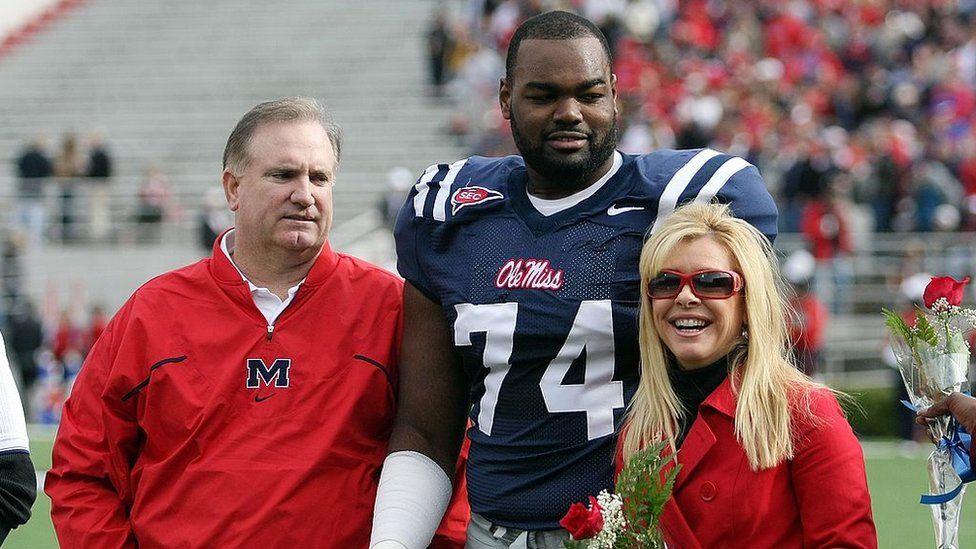
Blind Side family feud reignites a cultural debate


Michael Oher alleges he was tricked into a conservatorship by the Tuohys
By Brandon Drenon
BBC News, Washington
A legal battle between a retired American football player and the family who helped raise him has reignited debate about the 2009 Hollywood film that dramatised their story.
It has also pulled the film’s lead actress, Sandra Bullock, into the controversy.
The Blind Side tells the tale of a struggling black teenager living in foster care who goes to college and becomes a star athlete with a white family’s help.
But now a court filing alleges that the rags-to-riches story is built on lies.
This week, former NFL player Michael Oher, whom The Blind Side is based on, filed a petition seeking to end his relationship with the Tuohys, the family who took him in.
Mr Oher, now 37, alleges he was never compensated for the film and “received nothing” for a story “that would not have existed without him”. The film-makers have so far not commented.
Image source, Getty Images
Sandra Bullock won an Academy Award for Best Actress for her role in the Blind Side
He also accused the Tuohy family of lying about adopting him and tricking him into signing a conservatorship when he was 18 – a process that did not legally make him a member of the family, but did give the Tuohys legal control over his finances.
The family called those allegations “hurtful and absurd”. They have dismissed the idea that they reaped huge profits from the film and branded the legal action a “shakedown”.
The Blind Side took more than $300m (£237m) at the global box office and millions more in home video sales.
Mr Oher’s claims have revived longstanding criticism that the movie feeds into a negative “white saviour” narrative – when a central white character saves a non-white character from unfortunate circumstances.
Bullock won an Academy Award for her role playing mother Leigh Anne Tuohy in the blockbuster. Some critics have called for her to return her Oscar, arguing her role played into an objectionable narrative.
“You might let Sandra Bullock off the hook about The Blind Side, but not me,” Ola Ojewumi, a public speaker and author, wrote on the social media platform X, formerly known as Twitter.
Bullock herself has not commented, but others have come to her defence, including her co-star Quinton Aaron, who played Mr Oher in the film.
“Saying stuff like she needs to relinquish her title doesn’t make any sense,” Mr Aaron told TMZ Sports this week.
“She gave a brilliant performance and that shouldn’t be tarnished for something that had nothing to do with her.”
TV and film critic Richard Roeper said: “It is totally misguided and unfair to assign blame to her for the new and deeply disturbing allegations about the real-life story.”
Image source, Getty Images
The Tuohys and their children, seen here at the movie premiere
The BBC has reached out to Bullock’s team for comment.
The Blind Side is far from the first film to be criticised for pushing a “white saviour” narrative.
Samantha Sheppard, a film professor at Cornell University, told the BBC the trope dates back to 1915 with the film Birth of a Nation, “a story about the necessity of white people to save the country”.
The “white saviour” narrative has also been seen in sports genre films like Glory Road in 2006, the 2013 movie about baseball player Jackie Robinson, 42, and the 2016 Jesse Owens movie Race, she said.
“What we see with these kinds of films is that even stories about black lives are not really about black people,” she said, “they are about the benevolence and the righteousness of white paternalistic forces.”
In 2010, actress Vanessa Williams spoke to journalist Barbara Walters about The Blind Side, saying: “It brings up a theme for black folks, that, OK, here’s another white family that saves the day… another black story that needs a white person to come in and lift them up.”
“Can you name a movie where black people saved white people?” Williams asked.
Prof Sheppard notes that portrayals of race in film have made strides in recent years, led by more filmmakers of colour.
Directors like Tyler Perry and Jordan Peele are “telling much more dimensional stories about black lives, where they don’t centralise white people”.
The renewed cultural debate over The Blind Side underscores how a movie once acclaimed as a feel-good classic is now viewed as so dated.
But for film fans, the Oher-Tuohy legal feud truly is the end of the happily ever after.
Source: https://www.bbc.co.uk/news/world-us-canada-66525890?at_medium=RSS&at_campaign=KARANGA
















